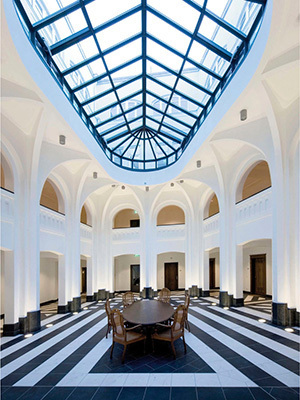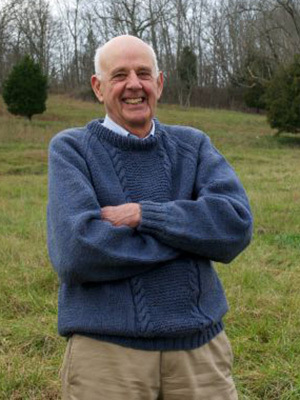Rob Krier named 2022 Richard H. Driehaus Prize laureate; Wendell Berry wins 2022 Henry Hope Reed Award
Rob Krier, an architect, urbanist, scholar, painter, sculptor and educator, has been named the recipient of the 2022 Richard H. Driehaus Prize at the University of Notre Dame. Renowned author Wendell Berry has been named the winner of the 2022 Henry Hope Reed Award. The public presentation of the awards has been postponed due to ongoing public health concerns during the COVID-19 pandemic.
“Rob Krier’s built work demonstrates a mastery of fine art, design and construction. He was one of the first of his generation to dedicate his architecture to the end of generating a harmonious urban fabric and a well-formed public realm in tandem. He paved the way for a return to the humanist ideal of seeking a civilized life in cities,” said Stefanos Polyzoides, Driehaus Prize jury chair and the Francis and Kathleen Rooney Dean of Notre Dame’s School of Architecture. “His influence as a theorist has been pervasive. For the last 30 years, his published books and his extensive teaching and lecturing have attracted and influenced students and professionals throughout the world.”

The jury citation states: “Through his engagement with a variety of urban settings, clients and types of projects, Krier has generated a diverse oeuvre that is steeped in the particulars of specific places: always responsive to local cultures, built heritage and environmental issues. His work as an artist drives the poetics of his architecture and urbanism. Design, painting, sculpture, architecture and urbanism become an intense, singular art form, capable of inspiring people to understand themselves as being profoundly rooted in their community and in the world.”
Born in Luxembourg, Krier traveled extensively throughout Italy before studying architecture at the Technical University of Munich in Germany. Throughout his career, he has balanced lecturing, teaching and writing with practicing architecture. From large-scale urban interventions in Berlin to new towns in the Netherlands and residential projects in Spain, Krier has built work around the world, in addition to the incalculable impact of his theories on countless other projects.
After graduating, he worked with Oswald Mathias Ungers in Cologne and Berlin in 1965-66 and Frei Otto in Berlin and Stuttgart in 1967-70. Krier later opened his own firm in Vienna, where he also served as professor of architecture at Vienna University of Technology from 1976 to 1998). He partnered with Nicolas Lebunetel in Montpellier, France, as well as Christoph Kohl in Berlin. He now lives and works in Berlin and in Liguria, Italy.
The Richard H. Driehaus Prize at the University of Notre Dame was established in 2003 to honor lifetime contributions to traditional, classical and sustainable architecture and urbanism in the modern world. The prize is awarded annually to a living architect whose work has had positive cultural, environmental and artistic impacts while maintaining the highest ideals of classical architecture in contemporary society. Krier is the 20th recipient of the Driehaus Prize, named for Richard H. Driehaus, founder and chairman of Chicago-based Driehaus Capital Management LLC, who passed away last year.

In conjunction with the Driehaus Prize, the $50,000 Henry Hope Reed Award, given annually to an individual working outside the practice of architecture who has supported the cultivation of the traditional city, its architecture and art, will be presented to Wendell Berry, an American poet, novelist, cultural critic, environmentalist and farmer, for his contributions to the discourse about nature and the city.
“Berry is the bard of rural life in America, a writer and poet whose work speaks for the Earth and challenges us to appreciate and steward nature as the foundation of our sustenance, our well-being and a reflection of who we are as a culture,” said Polyzoides. “His writing and commentary have had an indirect but still profound influence on our built environment, offering inspiration and direction as to where and how nature should prevail over architecture, a fundamental question for our age.”
The jury citation reads, “Over the years, humanity has increasingly encroached upon natural landscapes with little regard for the long-term urban and environmental impact. Berry has been a voice of conscience in advocating for the conservation of the miracle and the bounty that is nature, proposing a relationship between places and people that honors and protects both.”
The author of many books of poetry, fiction, essays and criticism, Berry has maintained a farm in Port Royal, Kentucky, for more than 50 years. Among his many honors, he was the recipient of the National Humanities Medal, bestowed by President Barack Obama in 2010. His other honors include the Ivan Sandrof Life Achievement Award by the National Book Critics Circle, the T.S. Eliot Prize, the Aiken Taylor Award for poetry, the John Hay Award of the Orion Society, and the Richard C. Holbrooke Distinguished Achievement Award of the Dayton Literary Peace Prize.
This year’s Driehaus Prize laureate was selected by a jury composed of Robert Davis, developer and founder of Seaside, Florida; Melissa DelVecchio, partner at Robert A.M. Stern Architects; Michael Lykoudis, professor of architecture at the University of Notre Dame; Elizabeth Plater-Zyberk, founding principal of DPZ; and Demetri Porphyrios, principal of Porphyrios Associates. Léon Krier, architect and urban planner, and the brother of Rob Krier, joined the jury for the selection of the Henry Hope Reed Award winner, but recused himself from the Driehaus Prize selection.
Latest Colleges & Schools
- Faculty receive prestigious early career awards from National Science FoundationDuring the 2024-25 academic year, four researchers in the University of Notre Dame’s Colleges of Engineering and Science received early-career awards from the National Science Foundation.
- ‘Prebunking’ false election claims may boost trust in electionsIn recent years, democracies worldwide have seen a growing erosion of trust in election outcomes and institutions, driven in part by fears of widespread fraud. New Notre Dame research finds that “prebunking” — providing accurate information before false claims spread — boosts trust in elections more effectively than traditional fact-checking.
- Justice Amy Coney Barrett to deliver Center for Citizenship and Constitutional Government lectureAmy Coney Barrett, associate justice of the Supreme Court of the United States, will speak at the University of Notre Dame at 4 p.m. Sept. 12 in the Leighton Concert Hall of the DeBartolo Performing Arts Center.
- Three Notre Dame researchers win NEH grants for humanities-based projectsDavid Hernandez, the Eli J. and Helen Shaheen Associate Professor of Classics, and Morgan Munsen, senior research and partnerships program manager at the Nanovic Institute for European Studies in the Keough School of Global Affairs, have each won an NEH Collaborative Research grant. Thomas A. Stapleford, associate professor in the Program of Liberal Studies, is leading a team that has been awarded a Humanities Research Center on Artificial Intelligence grant.
- Open-access database offers insights into U.S. congressional candidatesEach election cycle, thousands of candidates vie for seats in the U.S. House of Representatives and the Senate. Until now, there has been no comprehensive, publicly available resource cataloging what those candidates say about who they are or what they stand for. A new open-access database called CampaignView, created by researchers at the University of Notre Dame, offers researchers, journalists and educators a powerful tool to understand congressional elections.
- First impressions count: How babies are talked about during ultrasounds impacts parent perceptions, caregiving relationshipPsychologist Kaylin Hill studied the impact of a parent’s first impression of their baby during an ultrasound exam. The words used by the medical professional to describe the baby (positive or negative) influence how the parents perceive their baby, relate to them after they're born and even how that child behaves as a toddler. The research has broad implications for how we train medical professionals to interact with expectant parents, as well as how we care for parents during the perinatal period when they are most susceptible to depression.













